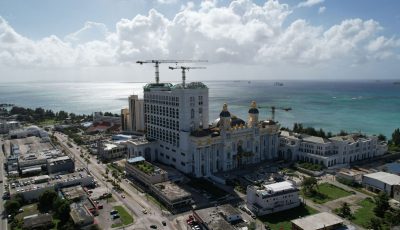E-gaming in Garapan is a mistake
In response to the bill proposed by Rep. Lorenzo I. Guerrero, it is evident that there will be many negative impacts if the bill gets enacted into law.
An online casino, otherwise known as an e-gaming facility, offers games simulated from a land-based casino like blackjack, roulette, baccarat, slots, poker, and other card games but amplified to a wider range of technologically advanced games. The hundreds of games offered in a variety of enticing choices, ease of access and all the conveniences, and the novelty itself of e-gaming on our island will translate to hundreds of potential gaming addicts in our local community.
Although the proposed “Garapan Core Zone” is suggested in the bill to be an area of the island where tourists frequent the most, we cannot simply put aside the apparent fact that it is also a local hotspot.
How much of that assumed $3-$5 million estimated to be generated by the outcome of this bill will actually be the locals’ money? It seems we jump at the idea of generating revenue for the retirees that we forget whose pockets this money is really coming out of. There is a logic behind attaching e-gaming facilities to hotels that speaks for itself: they are intended to be marketed to tourists.
Hotels serve as a melting pot for tourists from all over the world. If we allow e-gaming facilities to be placed in a more public area, the likelihood of locals being drawn into that same e-gaming melting pot increases significantly. Besides, what tourist wants to walk a lengthy distance from their hotel to an e-gaming facility when they can simple push a button on the elevator and be taken down to the facility conveniently located at their hotel lobby?
We must place ourselves in the shoes of our tourists and ask ourselves, “Is this really designed for them?” or “Will this be a more slippery slope for the locals who spend their days in poker parlors anyways?”
What makes e-gaming facilities any different than the numerous poker parlors placed around the island? There is slim to no difference other than the idea that these proposed e-gaming facilities will be more aesthetically pleasing to walk into. The temptation lies in the location and we cannot stand behind a bill that allows a bigger threat to the recovery from our social ills.
Is e-gaming the answer or are there other industries that we can channel to provide for our tourists’ entertainment needs? House Bill 19-150 poses the concern whether they should market e-gaming in hotels and poses the question, “Will gambling adversely affect their primary market—the traditional family demographic?” I believe that this question should be thrown back to the supporters of this bill. There will most certainly be a threat to the family demographic if all our tourists see in Garapan are these e-gaming facilities.
We should be looking for tourist-related entertainment alternatives that are family friendly. The options are out there so let us not take the easy way out.
Abbys Mitchell
San Vicente



























